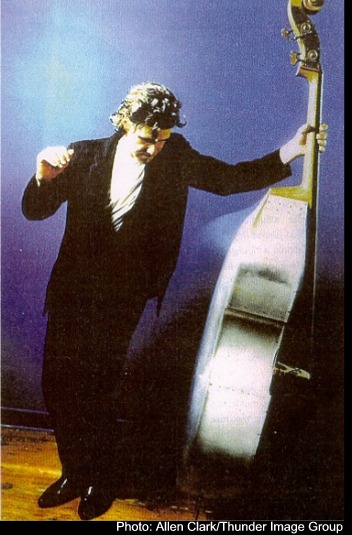
Sideman - Musician Magazine Bassics Magazine Bass Player Crosstalk - Music Connection Bass Notes - Bass Player Magazine Steady Rollin' by Bob Margolin - Blues Review Nightwatch - The Washington Post
Sideman Column in Musician Magazine, August 1998
You've built up a lot of miles playing root-oriented gigs and sessions. Does it help to know about the
history of that music when you're looking for work?
Well, I'm not working very much right now [laughs]. But I think it helps once you've already hooked up
for a gig. It helped with Keith [Richards], because he's such a blues fan. When we started jamming
around, he'd play a Chuck Berry tune, and he knew that I knew the right stuff to go with those tunes
because I've listened to tons of Willie Dixon.
What did you learn about the blues from listening to those old records?
For one thing, everyone is constantly playing, but it's call-and-response. The harp player blows,
and the guitar player does something against that, and the piano player does something against that. It
keeps going around in a circle, with no one laying out. Yet they're not in their own little world, like
in free-form blowing. They're really listening. Nobody's playing any incredible shit, since it's not
jazz, so you listen to it as a whole groove. Like, what's the soul of this music? The vibe?
There are blues bands that stick faithfully to twelve-bar verses with a straight-up rhythm…
Resume
The Rolling Stones
Marshall Crenshaw
Jimmy Witherspoon
Bob Margolin
John Mooney
|
Blues-rock bands.
You can kind of cruise on automatic with those groups. So how do you develop the sensitivity to know when to
add or drop beats in that more authentic Muddy Waters style?
It's really about listening to the vocalist. You'll never figure out what to do from the guitar. You've
got to follow the singer.
On that kind of a gig you wouldn't walk up to a chord change.
Right. If you're walking the bass, you're forcing the issue. You have to lay out on roots so you can make
the change without sounding like, "Oops! Here's the change!"
You once jammed with Marshall Crenshaw at a party. Then a few weeks later you sent him a postcard that
offered your services as a bassist. Nine months later he called you for a European tour. Do you think
that postcard is what got you the gig?
Yeah, but that's because a postcard wasn't inappropriate. I wouldn't have called him, for instance; I didn't
know the guy. And I didn't say, "I need a gig. Please hire me." I just said facetiously, "If you ever
need a bass player, give me a holler."
No pressure.
Yeah. Just like Keith. After we met and played some, a mutual friend gave me his phone number and
said, "You should call and tell him you had a good time." That kind of thing means something to him. Later
he gave me his fax number - Keith loves to get faxes - so every few months I faxed him this cartoon of myself
that someone had drawn. I certainly didn't hound him, but I said, "We don't get to see each other that much,
so in case you forget what I look like …" It had this extreme nose and hair all over [laughs], so I thought
he'd get a kick out of it.
Are you still playing gigs?
Sure. Right now I'm mainly taking rock & roll gigs - straight-up, sweaty, roots rock & roll. Ignorant,
gut-level shit. I love it.
-Robert L. Doerschuk
Musician August, 1998
| 
